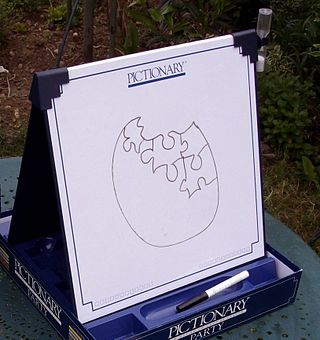
Pictionary is a charades-inspired word-guessing game invented by Robert Angel with graphic design by Gary Everson and first published in 1985 by Angel Games Inc. Angel Games licensed Pictionary to Western Publishing. Hasbro purchased the rights in 1994 after acquiring the games business of Western Publishing. Mattel acquired ownership of Pictionary in 2001. The game is played in teams with players trying to identify specific words from their teammates.

Candy Land is a simple racing board game created by Eleanor Abbott and published by Milton Bradley in 1948. The game requires no reading and minimal counting skills, making it suitable for young children. No strategy is involved as players are never required to make choices; only following directions is required. About one million copies per year are sold.

Sorry! is a board game that is based on the ancient Indian cross and circle game Pachisi. Players move their three or four pieces around the board, attempting to get all of their pieces "home" before any other player. Originally manufactured by W.H. Storey & Co in England and now by Hasbro, Sorry! is marketed for two to four players, ages 6 and up. The game title comes from the many ways in which a player can negate the progress of another, while issuing an apologetic "Sorry!"

Taboo is a word, guessing, and party game published by Parker Brothers in 1989. The objective of the game is for a player to have their partners guess the word on the player's card without using the word itself or five additional words listed on the card.
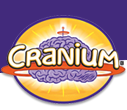
Cranium, Inc. was a toy and board game developer. The company was founded in 1998 by two former Microsoft executives, Richard Tait and Whit Alexander. They co-developed the Cranium board game.

Guess Who? is a two-player board game where players each guess the identity of the other's chosen character. The game was developed by Israeli game inventors Ora and Theo Coster, also known as Theora Design. It was first released in Dutch in 1979 under the name Wie is het? Milton Bradley then produced the game in the United Kingdom, and it was brought to the United States in 1982. It is now owned by Hasbro.The classic edition is currently being produced by Winning Moves Games USA.

Catch Phrase is a word guessing party game commercially available from Hasbro.

Killer Bunnies and the Quest for the Magic Carrot is a noncollectible card game created by Jeffrey Neil Bellinger and graphic design/illustrations by Jonathan Young. Other artists have contributed to the game, including early contributions by "Alex" Alexander, plus Matthew Holliday, Alex Julian, Harry Moore and Dave Montes.
Personal Preference is a 1987 board game created by Donal Carlston that involves guessing the order in which a player prefers foods, activities, people, and other items compared to one another. The game was published by Broderbund in the United States, Playtoy Industries in Canada, and Parker Brothers International in Britain.
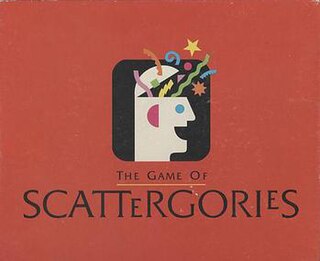
Scattergories is a creative-thinking category-based party game originally published by Milton Bradley in 1988. The objective of the 2-to-6-player game is to score points by uniquely naming objects within a set of categories, given an initial letter, within a time limit. The game is based on a traditional game called "Categories".
Outburst is a trivia party game designed by Brian Hersch and first published in 1986. Two teams compete over multiple rounds to reach 60 points by guessing items listed on a Topic Card within a time limit.
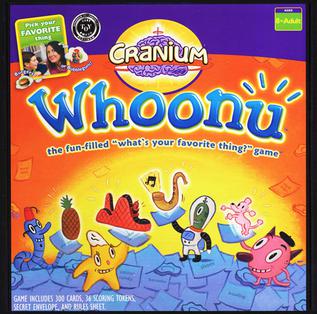
Cranium Whoonu is a party game manufactured by Cranium, Inc. Whoonu is billed as "the fun-filled 'what's your favorite thing?' game".

Probe is a parlor game or board game introduced in the 1960s by Parker Brothers. It is reminiscent of the simple two-person game Hangman, whose object is to guess a word chosen by another player by revealing specific letters. Probe extends the number of players to a maximum of four and introduces additional game elements that increase the levels of both skill and chance. Like Hangman, each player has a secret chosen word. But unlike Hangman, the game ends when the last word, not the first word, is revealed. All players remain in the game until the end. It was created by Ted Leavitt and licensed by him to Parker Brothers.
The Figure It Out board game was based on the popular children's game show Figure It Out on Nickelodeon. It was produced by Cardinal Games in 1998 and included a Billy the Answer Head board that was coated to allow for writing and erasing with crayon, two sets of game cards, and a timer.
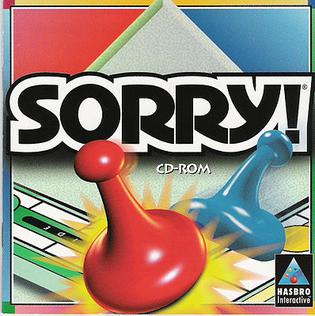
Sorry! is a 1998 video game based on the board game of the same name. It offers classic Sorry! and also a mode called Way Sorry!, where new cards are introduced, including Bully, Buddy, Punish, and Happy. The animated pawns talk, joke, and make amusing remarks during gameplay that relate with the colors' personalities. There are cutscenes as well, which show what happens afterward when a specific color wins. Rules are identical to normal play; however there are some options for "house rules", such as being allowed to bump teammates. Both the Classic and Strategy games are available.

A game is a structured form of play, usually undertaken for entertainment or fun, and sometimes used as an educational tool. Many games are also considered to be work or art.

Dixit, is a French board game created by Jean-Louis Roubira, illustrated by Marie Cardouat, and published by Libellud. Using a set of cards illustrated with dreamlike images, players select cards that match a title suggested by the designated storyteller player, and attempt to guess which card the storyteller selected. The game was introduced in 2008. Dixit won the 2010 Spiel des Jahres award.
Family Game Night is an American television game show based on Hasbro's family of board games and EA's video game franchise of the same name. The show was hosted by Todd Newton. Burton Richardson was the announcer for the first two seasons; he was replaced by Stacey J. Aswad in the third season, and Andrew Kishino was hired for the fourth season. The 60-minute program debuted on October 10, 2010, on The Hub ; it was previewed on October 9, 2010, on its sister channel, TLC. Seasons 1 and 2 contained 26 and 30 episodes respectively. Seasons 3, 4 and 5 each contained 15 episodes. Season 2 premiered on Friday, September 2, 2011, with additional games being added. The games added to the second season included Cranium Brain Breaks, Green Scream, Ratuki Go-Round, Simon Flash, Operation Sam Dunk, Trouble Pop Quiz, and Spelling Bee. However games from the previous season were still kept.
Cluedo, known as Clue in North America, is a murder mystery-themed multimedia franchise started in 1949 with the manufacture of the Cluedo board game. The franchise has since expanded to film, television game shows, book series, computer games, board game spinoffs, a comic, a play, a musical, jigsaws, card games, and other media.















